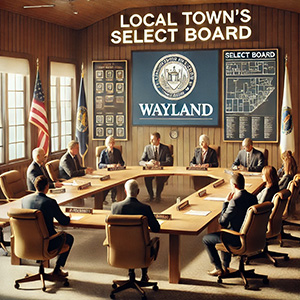The Select Board met Monday, Oct. 20
Liquor License Transfer
After a public hearing, the board voted to approve a change of stock, officers, and manager for Liquor World, 302 Commonwealth Road. The store will be rebranded as Liquor Hub. Attorney Matthew Porter explained that Nitant Raval, previously 50 percent owner, is acquiring full ownership. Michael Hines, a 23-year veteran of the package-store industry, will serve as manager.
Town Manager Michael McCall explained that under Massachusetts law, Wayland currently holds 19 total on-premises liquor licenses — 14 all-alcohol and five wine-and-malt — as determined by the Alcoholic Beverages Control Commission (ABCC). With Terrain’s license, all 14 all-alcohol licenses are now issued, leaving four available wine-and-malt licenses.
McCall and Chair Carol Martin proposed that the town pursue two complementary actions: adopt a state-authorized conversion provision under the 2024 Massachusetts Alcohol Law Reform Act, which allows towns, with Town Meeting approval, to convert existing wine-and-malt licenses into full all-alcohol licenses; or request additional new liquor licenses through a home-rule petition at Town Meeting to support future commercial development.
McCall noted that converting four of the five unused wine and malt licences would provide flexibility for new restaurants or mixed-use developments without waiting for special legislation.
Expanded Charge for Advisory Committees
The board approved revised language clarifying procedures for Select Board advisory committees. The updated charge requires that “all proposals entailing material expenditures of staff time or town resources must be discussed with the Select Board and receive prior approval before proceeding.”
Advisory committees may discuss early concepts internally, but before conducting any due diligence or research the idea must be reviewed and approved.
The board’s 5-0 vote created a formal approval chain to improve communication: committee to liaison to full Select Board to town manager/staff. This will ensure that no advisory group independently launches or develops projects without explicit board consent.
McCall supported the change, explaining that some advisory groups had been contacting department heads or Town Counsel directly, consuming staff time and generating costs without board awareness. He said all such requests should go “through the liaison to the Select Board and, if appropriate, to me,” but only after board approval.
The “expanded charge” will be added to the written charge of every Select Board advisory committee on the town website and distributed to all advisory committee chairs and their staff liaisons with a short explanatory memo from Chair Martin.
Debt Exclusion and Public Communication
McCall informed the board that the town has not adopted MGL Ch. 53, §18B, which would allow it to mail informational materials about ballot questions. Without that authorization, the town would be able to post factual explanations on its website but not distribute them directly.
Board members discussed holding a public information forum on Dec. 1 and publishing FAQs online. McCall said he and Assistant Town Manager Kelai Power-Spirlet are preparing a neutral fact sheet explaining Proposition 2½ and the debt exclusion process.
Snake Brook Dam Project and Grant
Discussion turned to the Snake Brook Dam rehabilitation, an estimated $2.9 million project. McCall reported that FEMA’s $1.4 million hazard-mitigation grant remains stalled due to federal furloughs. The town has $600,000 in ARPA funds and an $884,000 state Sea Wall and Dam rehabilitation grant available but may need to proceed without FEMA assistance because of the ARPA deadline of December 2026 and seasonal timing constraints for when construction can take place.
The board approved acceptance of the state grant (Consent Item 6) but deferred action on a $295,000 engineering contract with Pare Corporation pending review of its terms and construction timeline.
Equity Audit Discussion
Human Rights Diversity Equity and Inclusion Committee Chair Karen Blumenfeld and consultant Dr. Eden-Reneé Hayes presented recommendations from the Community Life and Engagement Study.
Blumenfeld said the report outlines about 40 recommendations across nine focus areas, emphasizing training, accessibility, and inclusive hiring practices. She urged the board to issue a public letter by year-end outlining next steps.
McCall noted that the town’s insurer, MIIA, offers diversity and inclusion training at no cost, which could address several recommendations without new spending.
Board members agreed that implementation should occur over several years and possibly incorporate grant funding or shared services. Martin said the board will hold a separate deliberation session in January to set priorities.
Town Manager Report
McCall announced that Moody’s reaffirmed Wayland’s AAA bond rating, citing strong financial management. He also reported on: New business openings celebrated with ribbon cuttings, including United Volleyball (Town Center), the Sudbury Food Pantry’s relocation to Wayland, and Mooie Nails in Cochituate.
The board later approved designating a part-time procurement specialist in the town manager’s office as a special municipal employee, allowing for limited hours of consulting. The role covers technical procurement work—helping the town comply with state public-bidding and purchasing laws, particularly for large or complex projects.
McCall noted that the town now has several staff members who have completed MCPPO training, but having an outside expert “on call” ensures compliance for high-value or time-sensitive purchases without creating a full-time position.
The special-employee designation allows the town to hire an experienced professional who already consults for other municipalities without violating state conflict-of-interest limits. Under that designation, the consultant may work part-time for multiple towns, provided total hours stay within state limits.
Economic Development and Energy Committee Appointments
The board voted unanimously to appoint Neeti Singhal Mahajan to the Economic Development Committee for a term ending June 30, 2028. Mahajan, a Wayland native described her background in business strategy and data analysis, noting her intent to “bring business acumen back to my hometown.”
They appointed Clovis Schaff as a non-voting associate member of the Energy and Climate Committee, term ending June 30, 2028. Schaff, a software engineer and volunteer with Energize Wayland and the HeatSmart Alliance, emphasized the importance of data analysis, climate education, and resident outreach.
Select Board Co-Sponsors ADU Information Forum
The board voted to co-sponsor an informational forum on accessory dwelling units (ADUs) alongside the Planning Board and the Wayland Housing Partnership.
Housing Partnership member Rachel Bratt explained that the forum would inform residents about a new state law under the Massachusetts Affordable Homes Act of 2024, which allows homeowners to create ADUs “by right.” Bratt said “This is strictly informational,” Bratt said. “We want homeowners to understand what’s possible under the new law.”
Additional Business
The board discussed drafting potential annual town meeting articles, including adopting Ch. 53 §18B for ballot communication and allowing conversion of wine-and-malt licenses to all-alcohol licenses under a 2024 state law along with seeking additional licenses for future use under the Municipal Empowerment Act.
















